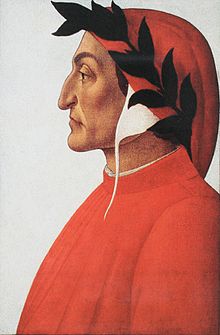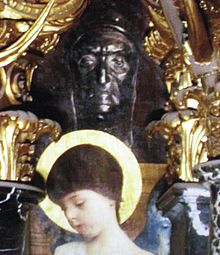Dante Alighieri
![]()
Dante is a redirect to this article. For the ship of the same name, see Dante Alighieri (ship, 1915). For other meanings, see Dante (disambiguation).
Dante Alighieri (Italian [ˈdante aliˈɡi̯ɛːri]![]() ; * May or June 1265 in Florence; † 14 September 1321 in Ravenna) was an Italian poet and philosopher. He overcame the previously dominant Latin with the Divine Comedy, written in Old Italian (or Tuscan), and led Italian to become a literary language. Dante is one of the most famous poets of Italian literature as well as of the European Middle Ages.
; * May or June 1265 in Florence; † 14 September 1321 in Ravenna) was an Italian poet and philosopher. He overcame the previously dominant Latin with the Divine Comedy, written in Old Italian (or Tuscan), and led Italian to become a literary language. Dante is one of the most famous poets of Italian literature as well as of the European Middle Ages.

Portrait of Dante Alighieri , Sandro Botticelli, c. 1495
Dante as a writer and philosopher
Dante's work draws confidently from the theology, philosophy, and other sciences (Artes liberales) of his time. It artfully refers to models in Italian, Provençal, Old French and Latin poetry. In doing so, Dante combines erudition and literary education with a high degree of independence in intellectual appropriation and in linguistic and poetic expression.More than any other poet before him, he places his own person as a lover and sufferer, as an errant and learner, at the centre of his works. In doing so, he does not simply confess himself and does not simply make himself the chronicler of his personal development, but stylizes the I of his works - their lyrical, narrative or instructive I and the experience it gives voice to - according to precise intentions of effect within the framework of an "autofiction" (Hausmann) that develops from work to work.
He combines this approach with the high ethical standard of offering the reader, the political society and even the church of his time a mirror for self-knowledge and a model on the path to improvement. For him, the goal of this path in the personal (as well as in the political and ecclesiastical) lies in conformity with the divine world order, as it is revealed, according to his conviction, in the Bible and its inspired interpretation by the early teachers of the Church, and partly already marked out in the works of the ancient poets (Virgil) and philosophers (Aristotle).
Reception
No other poet before or after Dante was annotated so often, so extensively, and with such an expenditure of erudition, a development that began shortly after his death with the glossing and public annotation of the Commedia. His own sons and, from the middle of the 14th century, Giovanni Boccaccio also contributed to it. The humanism that was emerging in Italy at this time and the Renaissance received Dante's work partly with critical disapproval, but also with admiration for his often only supposed anticipation of their own guiding ideas.In more recent times, Dante's rediscovery was at first under the sign of a romantic interest in the Middle Ages and the appropriation of his work for the formation of a new political and cultural self-image of the Italian nation emerging during the Risorgimento. Progressive as well as conservative or reactionary, Catholic as well as Protestant, but also esoteric or anti-clerical milieus claimed Dante for their own purposes and added many a distortion to the understanding of his work.
Since the 19th century, German, English and, more recently, American scholars have provided important impulses for the scientific constitution of Dante philology and Dante studies. The research has been able to clarify many misunderstandings, but has also passed on some of the biases of the pre- and extra-scientific establishment to the present day.
The asteroid of the inner main belt (2999) Dante as well as the moon crater Dante are named after him.

Gustav Klimt: Bust of Dante in Old Italian Art, in the Staircase of the Kunsthistorisches Museum in Vienna (1891)
.jpg)
Dante and Virgil in Hell , painting by Eugène Delacroix, 1822
_b_341.jpg)
Dante pleading before Emperor Henry VII. , illustration by Hermann Plüddemann in the magazine Die Gartenlaube, 1865
Questions and Answers
Q: Who was Dante Alighieri?
A: Dante Alighieri was a major Italian poet of the Late Middle Ages/Early Renaissance. He is known for his central work, the Commedia (Divine Comedy), which is considered one of the greatest literary works in the Italian language and a masterpiece of world literature.
Q: What is Dante referred to as?
A: Dante is often referred to as "the Father of the Italian language" and il Sommo Poeta (the Supreme Poet). He is also known as one of "the three fountains", alongside Petrarch and Boccaccio.
Q: When did Dante live?
A: Dante lived around 1265 - 1321.
Q: What is The Divine Comedy?
A: The Divine Comedy is an epic poem written by Dante Alighieri that consists of three books - Inferno, Purgatorio, and Paradiso - each containing 33 cantos. It has been a source of inspiration for artists for almost seven centuries.
Q: What is the most famous section in The Divine Comedy?
A: The most famous section in The Divine Comedy is the first third of it, which consists of 34 cantos called Inferno and features Dante's vision of Hell.
Q: Who wrote the first biography on Dante Alighieri?
A: Giovanni Villani wrote the first biography on him.
Search within the encyclopedia